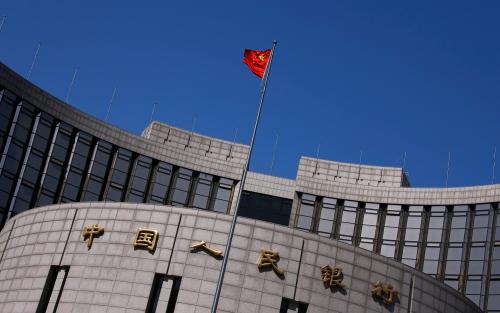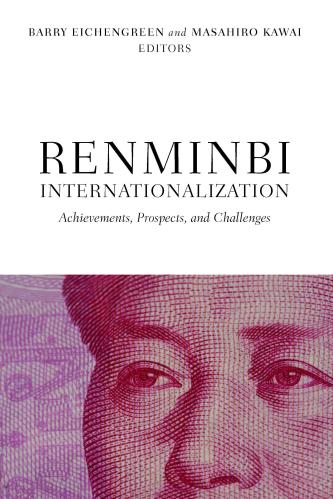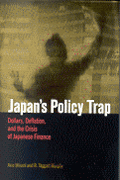Content from the Brookings Institution India Center is now archived. After seven years of an impactful partnership, as of September 11, 2020, Brookings India is now the Centre for Social and Economic Progress, an independent public policy institution based in India.
Subir Gokarn says our ability to withstand shocks is greater than it was three years ago
Watch his full interview on CNBC Awaaz here
What is your assessment of the depreciating Chinese currency? Do you foresee currency wars taking place?
We saw the Chinese yuan depreciate by about 3% last week and it has stayed there. It hasn’t depreciated much more. I don’t think that one-time adjustment reflects a currency war. It does have some consequences: It will make Chinese exports more competitive undoubtedly. What is a little more worrying is that with that change many other currencies, particularly Southeast Asian currencies, have depreciated far more so that makes those countries’ exports that much more competitive, both in terms of their exports to India – we have some free trade agreements which will exploit that – but also in terms of competing for markets in the US and Europe. There is some concern that an already sluggish export scenario in India will be aggravated by the currency changes in other countries.
Of course, the rupee has also depreciated. That should help to offset to some extent.
If the Chinese currency stabilises at the current level, which is 3% below last week’s mark, then I think the adjustment may play itself out. If there’s further depreciation, which is where I think the risks are more significant, then that might result in a significant round of currency adjustments, which is very difficult to control once it starts.
At the moment I’m not that concerned about the currency aspect of it, but I think we have to be very watchful.
The other risk is that even if currencies don’t change, every country which is dependent on exports to a certain extent will become much more aggressive in pushing its exports. Here we are certainly vulnerable because we’re importing lots of manufactured goods from China and those will become cheaper for Indian customers, who will therefore be incentivised to buy them. This will in turn put pressure on domestic producers. We want to be a little careful of how this thing pans out, even if the exchange rate itself does not play that important a part.
Does this kind of currency war show us that our central banks can go so much — in terms of controlling fiscal deficit, inflation, current account deficit – and no further?
If we were in the same situation now, where the current account deficit was close to 5%, inflation at 7-8%, even higher, fiscal deficit between 6-6.5%, would our outcome have been similar? I would argue no, our outcome would have been much worse than it has been in the last few days. Let’s not lose sight of the fact that those fundamentals are absolutely critical in our ability to withstand shocks. We are at a much better macro situation now than we were three years ago. We are much less impacted by external shocks than we would have been otherwise. Adjustments will happen, things will stabilise. We don’t know when they will stabilise, pressure may continue to be exerted, but our ability to withstand shocks, I think, is much greater.
We need to take advantage of this very comfortable macro-economic situation we have right now to push ahead with all of the structural issues. The biggest problem we have is infrastructure. Without resolving that, we are not going to be able to accelerate our growth. We can be comfortable in the 6% or 7-7.5% (GDP) that we’re now experiencing, but unless we resolve infrastructure we won’t be able to see it accelerate sharply.
Should the Reserve Bank of India intervene in stemming the depreciation?
There is a merit in orderly depreciation when the economy is going slowly. If we agree that there is excess capacity, if we agree that exports are sluggish – in fact, we’ve had negative growth in exports for the last several months – then a currency depreciation is actually a growth stimulant. In a sense it also complements interest rate policy by providing an expansionary force to the economy. In these circumstances depreciation is not necessarily a bad thing.
If you’re in a high inflationary situation, and a lower currency was going to add to inflation, then in that situation a different argument can be made to try and resist depreciation. But at the Central Bank, certainly from my time and continuing now, intervention has never been seen as an attempt to peg the currency or to fix the rate. It is always to contain and reduce volatility.
I think that’s the message RBI Governor Rajan has also sent out in his statement yesterday that they will certainly use intervention to deal with excessive volatility but the market has to determine the extent of it.
Related post: To avoid freeze in markets, central banks have to act
The Brookings Institution is committed to quality, independence, and impact.
We are supported by a diverse array of funders. In line with our values and policies, each Brookings publication represents the sole views of its author(s).









Commentary
Op-edVIDEO Yuan depreciation: India needs to protect domestic producers
CNBC Awaaz
August 26, 2015